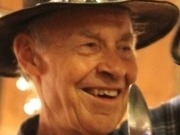Dudley Herschbach was born in San Jose, California (1932) and received his B.S. degree in Mathematics (1954) and M.S. in Chemistry (1955) at Stanford University, followed by an A.M. degree in Physics (1956) and Ph.D. in Chemical Physics (1958) at Harvard. After a term as Junior Fellow in the Society of Fellows at Harvard (1957-1959), he was a member of the Chemical Faculty at the University of California, Berkeley (1959-1963), before returning to Harvard as Professor of Chemistry (1963), where he is now Baird Professor of Science (since 1976). He has served as Chairman of the Chemical Physics program (1964-1977) and the Chemistry Department (1977-1980), and Co-Master with his wife Georgene of Currier House (1981-1986). His teaching includes graduate courses in quantum mechanics, chemical kinetics, molecular spectroscopy, and collision theory, as well as undergraduate courses in physical chemistry and general chemistry for freshmen, his most challenging assignment. He is engaged in several efforts to improve K-12 science education and public understanding of science. He serves as Chair of the Board of Trustees of Science Service, which publishes Science News and conducts the Intel Science Talent Search and the Intel International Science and Engineering Fair.
He is a Fellow of the American Academy of Arts and Sciences, the National Academy of Sciences, the American Philosophical Society, and the Royal Chemical Society of Great Britain. His awards include the Pure Chemistry Prize of the American Chemical Society (1965), the Linus Pauling Medal (1978), the Michael Polanyi Medal (1981), the Irving Langmuir Prize of the American Physical Society (1983), the Nobel Prize in Chemistry (1986), jointly with Yuan T. Lee and John C. Polanyi, the National Medal of Science (1991), the Jaroslav Heyrovsky Medal (1992), the Sierra Nevada Distinguished Chemist Award (1993), the Kosolapoff Award of the ACS (1994), the William Walker Prize (1994); and named by Chemical Engineering News among 75 leading contributors to the chemical enterprise in the past 75 years (1998), and the Council of Scientific Society President's Award for Support of Science (1999).
Professor Herschbach has published over 400 papers. His current research is devoted to methods of orienting molecules for studies of collision stereo dynamics, means of slowing and trapping molecules in order to examine chemistry at long deBroglie wavelengths, reactions in catalytic supersonic expansions, and a dimensional scaling approach to strongly correlated many-particle interactions, in electronic structure and Bose-Einstein condensates.

